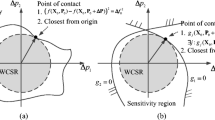Abstract
This paper proposes an adaptive probability analysis method that can effectively generate the probability distribution of the output performance function by identifying the propagation of input uncertainty to output uncertainty. The method is based on an enhanced hybrid mean value (HMV+) analysis in the performance measure approach (PMA) for numerical stability and efficiency in search of the most probable point (MPP). The HMV+ method improves numerical stability and efficiency especially for highly nonlinear output performance functions by providing steady convergent behavior in the MPP search. The proposed adaptive probability analysis method approximates the MPP locus, and then adaptively refines this locus using an a posteriori error estimator. Using the fact that probability levels can be easily set a priori in PMA, the MPP locus is approximated using the interpolated moving least-squares method. For refinement of the approximated MPP locus, additional probability levels are adaptively determined through an a posteriori error estimator. The adaptive probability analysis method will determine the minimum number of necessary probability levels, while ensuring accuracy of the approximated MPP locus. Several examples are used to show the effectiveness of the proposed adaptive probability analysis method using the enhanced HMV+ method.
Similar content being viewed by others
References
Bucher, C.G. 1988: Adaptive Sampling – An Iterative Fast Monte Carlo Procedure. Struct Saf5, 119–126
Chen, W.; Lewis, K.; Schmidt, L. 2000: Decision-Based Design: An Emerging Design Perspective. Eng Valuation Cost Anal. special edn. on “Decision-Based Design: Status & Promise” 3(1–2), 57–66
Du, X.; Chen, W. 2001: A Most Probable Point-Based Method for Efficient Uncertainty Analysis. Des Manuf4(1), 47–66
Du, X.; Sudjianto, A.; Chen, W. 2003: An Integrated Framework for Optimization Using Inverse Reliability Strategy. DETC-DAC48706, ASME Design Engineering Technical Conferences, Chicago, IL, September 2003
D’Errico, J.R.; Zaino, N.A. 1988: Statistical Tolerancing Using a Modification of Taguchi’s Method. Technometrics30(4), 397–405
Evans, D.H. 1972: An Application of Numerical Integration Techniques to Statistical Tolerancing, III-General Distributions. Technometrics14(1), 23–35
Evans, D.H.; Falkenburg, D.R. 1976: Computer Programs for the Quadrature Approximation for Statistical Tolerancing. J Qual Technol8(2), 108–114
Haldar, A.; Mahadevan, S. 2000: Probability. Reliability and Statistical Methods in Engineering Design. New York: Wiley
Hasofer, A.M.; Lind, N.C. 1974: Exact and Invariant Second Moment Code Format. J Eng Mech Division ASCE100, 111–121
Lancaster, P.; Salkauskas, K. 1986: Curve and Surface Fitting; An Introduction. London: Academic
Lee, T.W.; Kwak, B.M. 1987–88: A Reliability-Based Optimal Design Using Advanced First Order Second Moment Method. Mech Struct Mach15(4), 523–542
Madsen, H.O., Krenk, S.; Lind, N.C. 1986: Methods of Structural Safety. Englewood Cliffs, NJ: Prentice-Hall
Melchers, R.E. 1989: Importance Sampling in Structural Systems. Struct Saf6, 6–10
Rackwitz, R.; Fiessler, B. 1978: Structural Reliability under Combined Random Load Sequences. Comput Struct9, 484–494
Rubinstein, R.Y. 1981: Simulation and Monte Carlo Method. New York: Wiley
Seo, H.S.; Kwak, B.M. 2003: An Improved Reliability Analysis Using Design of Experiments and an Application to Tolerance Design. The 5th World Congress of Structural and Multidisciplinary Optimization. Lido di Jesolo, Italy, May 19–23 2003
Southwest Research Institute 1996: NESSUS/FPI User’s Manual, Version 2.3, San Antonio, TX
Tu, J.; Choi, K.K. 1999: A New Study on Reliability Based Design Optimization. J Mech Des ASME121(4), 557–564
Wu, Y.-T. 1994: Computational Methods for Efficient Structural Reliability and Reliability Sensitivity Analysis AIAA J32(8)
Wu, Y.-T.; Wirsching, P.H. 1987: New Algorithm for Structural Reliability Estimation. J Eng Mech ASCE113(9), 1319–1336
Youn, B.D.; Choi, K.K. 2003: Selecting Probabilistic Approaches for Reliability-Based Design Optimization. AIAA J42(1), 124–131
Youn, B.D.; Choi, K.K.; Gu, L.; Yang, R.-J. 2004: Reliability-Based Design Optimization for Crashworthiness of Side Impact. J Struct Multidisc Optim27(3), 272–283
Youn, B.D., Choi, K.K.; Park, Y.H. 2001, 2003: Hybrid Analysis Method for Reliability-Based Design Optimization. J Mech Des, ASME125(2), 221–232, 2003; Proceedings of 2001 ASME Design Engineering Technical Conferences: 27th Design Automation Conference. Pittsburgh, PA
Author information
Authors and Affiliations
Corresponding author
Rights and permissions
About this article
Cite this article
Youn, B., Choi, K. & Du, L. Adaptive probability analysis using an enhanced hybrid mean value method. Struct Multidisc Optim 29, 134–148 (2005). https://doi.org/10.1007/s00158-004-0452-6
Received:
Revised:
Published:
Issue Date:
DOI: https://doi.org/10.1007/s00158-004-0452-6




